In October 2012, Brazil undertook a review of its National Action Plan for the Conservation of Albatrosses and Petrels (PLANACAP) that was first produced in 2006. One of the main goals of the review was to adjust PLANACAP in order to reflect better ACAP’s priorities. As a result, PLANACAP’s actions and goals now follow more accurately those recommended by ACAP
Click here to access the Executive Summary for the 2012 version of PLANACAP in English.
PLANACAP also includes conservation actions regarding breeding sites of the globally Vulnerable Trindade Petrel Pterodroma arminjoniana and Audubon''s Shearwater Puffinus lherminieri, the only procellariiform species that breed within Brazilian territory. Neither species is listed by the Albatross and Petrel Agreement.
Monitoring the implementation of PLANACAP was considered at a workshop at the National Academy of Biodiversity (ACADEBIO) in Iperó (SP) on 10 June. The workshop aimed to evaluate progress with actions agreed to in October last year, including conservation measures for the Trindade Petrel and Audubon's Shearwater. Both species face specific conservation problems with breeding colonies on South Atlantic islands vulnerable to introduced predators and habitat destruction. Another action discussed was the adoption of measures to reduce the capture of seabirds in six industrial fishing techniques, including demersal longlining. Conservation bodies present at the workshop included Projeto Albatroz represented by Tatiana Neves, one of two newly-appointed Vice-convenors of ACAP’s Seabird Bycatch Working Group.

Click here for information on the June workshop in Portuguese.
John Cooper, ACAP Information Officer, 21 June 2013

 English
English  Français
Français  Español
Español